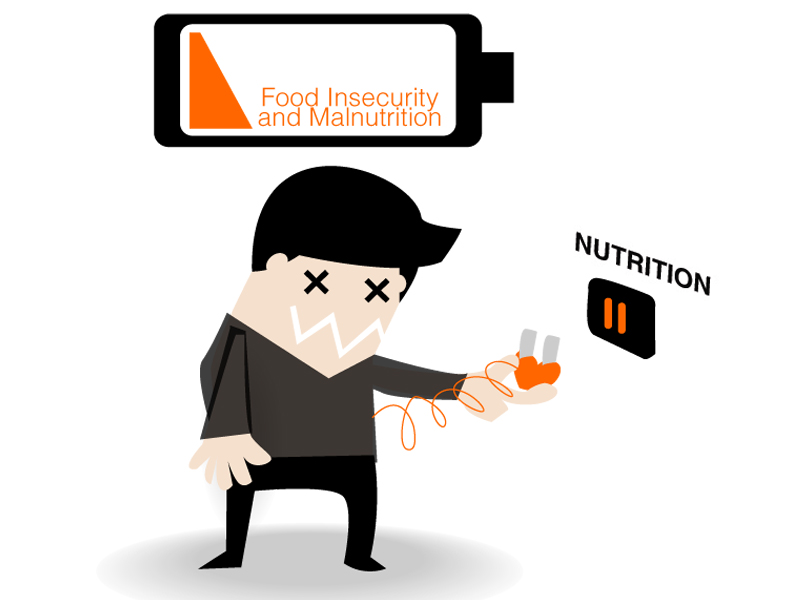
After years of working with the undernourished, I have realised that malnutrition is simply too convoluted an issue to be summarised into tables and charts. In Pakistan, it gets harder to do as there are so many intangible, social factors contributing to the problem.
While food insecurity and lack of access to healthy diets are indeed major contributors to malnutrition, a total absence of food is highly unlikely. In fact, a study I conducted on mothers with severely undernourished children found that 75% of the subjects had either a normal or an obese nutritional status and yet, their children were emaciated to the bone. However, further research showed that many of the children inherited malnutrition from their mothers in the womb. In a country where pregnancy is stringed to a number of baseless beliefs, it is unsurprising that malnutrition among children germinates right from the onset of conception.

In most ruralised families, pregnancy is an opportunity for the elders to impart their knowledge to the expecting mother. If you question the latter regarding her diet, she will tell you that her mother-in-law has forbidden her from consuming lentils, corn, cabbage, potatoes and almost all other vegetables as they are baadi and can cause stomach troubles. Bananas and rice are believed to bring on pneumonia and oil and butter are restricted as they might lead to the easy passage of the baby through the birth canal or premature delivery. Also, beef, eggs, mangoes and spices are considered to be garam and precursors for miscarriage. Only yakhni (soup) with roti (flat bread) and small portions of diluted milk are given to maintain calories.
With so many essential food items off limits, how can a woman possibly give birth to a healthy baby? Reema and Iqra, nutritionists at the Children’s Hospital Complex Multan, claim that pregnancy is the most crucial stage for both the mother and unborn child, especially when it comes to nutrition. “The nutritional status of the mother during pregnancy and lactation determines the health, development and immunity of the unborn baby,” explains Reema. “Reduced intake of eggs, beef, lentils, chickpeas and milk during the first trimester leads to a lack of proteins, vitamins and calcium that are essential for muscle development.” She also says that cutting down on carbohydrates may result in the breaking down of the mother’s own muscles to fulfill the energy needs of the baby. Iqra adds, “Under-nutrition is responsible for low birth weight which ultimately leads to higher infant and maternal mortality rates.”
Unfortunately, this problem persists long after pregnancy and into the life of the newborn baby. The baby is deprived of breast milk and given tea water or ghuthi (usually honey) for the first few days and if the mother wishes to feed later, she is often met with little or no breast milk, thanks to her poor diet during pregnancy. Once again, how can one expect a baby devoid of healthy or adequate breast milk to grow up nourished?
I have found that breast-feeding in general has taken a backseat in Pakistan, regardless of social class and creed. The lower-income brackets follow an ancient and rather ridiculous method to testify against breast milk: the spider-in-milk method. Herein, a spider is dipped in a glass of breast milk and if it dies, the milk is dubbed poisonous and therefore, unsafe for the baby. The affluent and educated, on the other hand, often leave their children in the hands of maids who simply prepare baby formula and force-feed it every time the baby cries.

Even the quality of formula administered has a direct impact on the nutritional status of a child. Not all brands, particularly the ones available in Pakistan’s rural localities, actually contain the ingredients and health benefits they boast of. The issue regarding the type of formula is just as pertinent when it comes to healthy child-rearing. For instance, a client once brought in her month-old son for a checkup, complaining that he was not growing or gaining weight. Upon further inquiry, I found that her family doctor had prescribed lactose-free formula, without any proof of the baby being lactose-intolerant. In fact, the baby was also taking breast milk without any complications, proving that he wasn’t really intolerant in the first place! In this case, the doctor’s negligence and the mother’s lack of awareness rendered the baby undernourished.
On the other end of the spectrum it is the quantity of the milk given, regardless of its type and quality. Many mothers fail to realise that milk is sufficient only up to a certain age. Once the baby is seven to nine months, its diet must be complemented by natural, healthy foods which will support and enhance development. All too often, I see clients who have kept their children on diluted milk for up to four years with little or no other solids. The problem of overfeeding is also quite common and many mothers worry about why their child refuses to eat solids. They don’t realise that the child’s stomach is simply too full with milk to ingest anything else.
You would be surprised at some of the other unwarranted myths, practices and biases many Pakistanis still adhere to which contribute to the wide array of social problems our country faces — malnutrition being just one of them. Giving hot tea to newborns, diluting milk three times before serving and denying a new mother all types of meat throughout the perpurieum are just some of them.

What we must realise is that the human body needs a sturdy foundation to support it and propel it towards a bright and healthy future. The dietary habits we inculcate during infancy will provide the basis of our children’s health during childhood, adolescence and even beyond that. Unfortunately, most parents find it easier to provide Rs50 as daily ‘canteen money’ and send their children off to school than to regulate the daily intake of pizzas, fries, samosas and fizzy drinks they indulge in there. A diet rich in oils and unhealthy fats might not lead to malnutrition but it can prove just as detrimental if left unchecked over a long period of time.
Perhaps proper counseling and education of our masses is the first step forward towards eradicating malnutrition in Pakistan. People should be informed as to why their beliefs and practices are incorrect and potentially fatal. Primary health care components should incorporate malnutrition testing and awareness in its Integrated Management of Childhood Illness (IMCI) department. When we understand that prevention is much easier and cost-effective than cure, we might be able to rid ourselves of this unhealthy lifestyle.
Published in The Express Tribune, Ms T, March 1st, 2015.











1735025557-0/Untitled-(96)1735025557-0-270x192.webp)











COMMENTS
Comments are moderated and generally will be posted if they are on-topic and not abusive.
For more information, please see our Comments FAQ